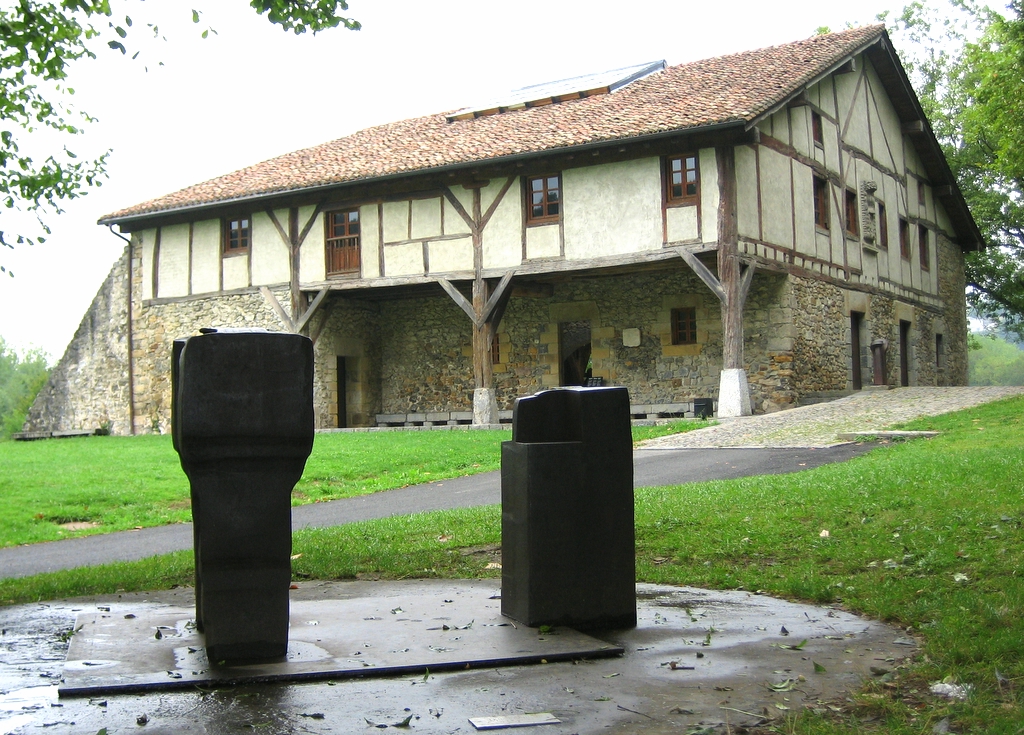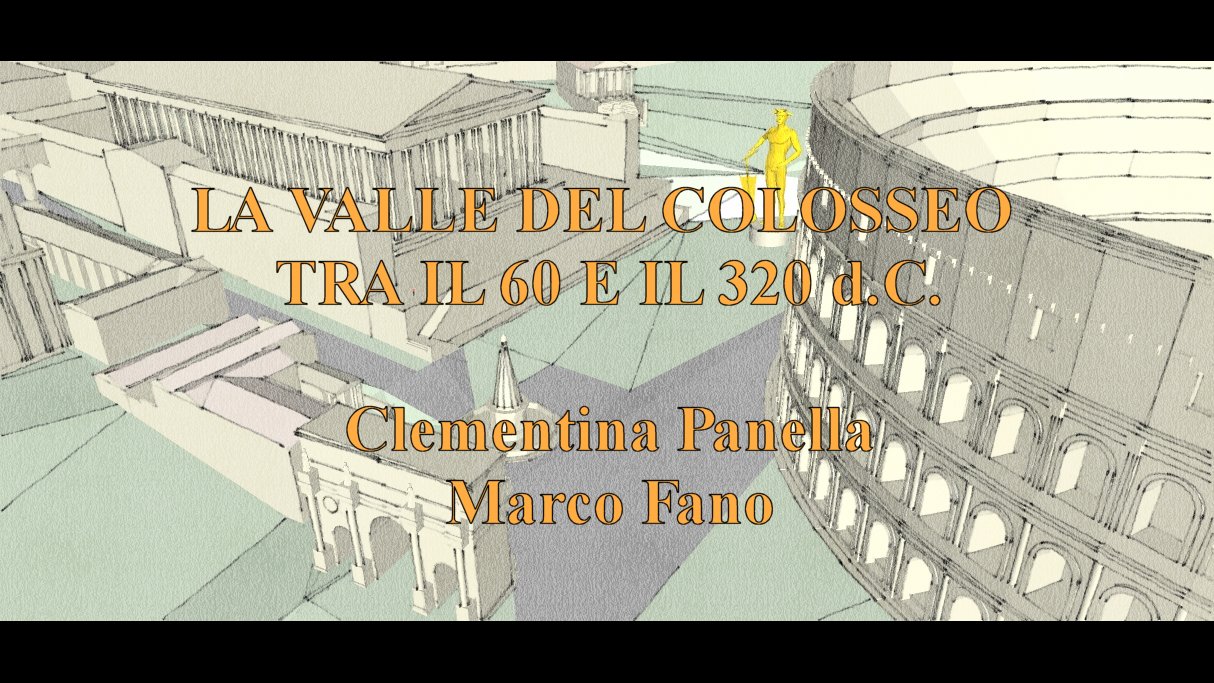Build Rome
-
@hepf said:
C'mon, you are fishing for compliments! You are doing a wonderful job, very detailed. I work on simplified exteriors, much easier.
My objection is for the conic roofing in the gymnasium, I think a domelike roof would be more appropriate.
Suppose you already have these drawings, but if not it may help. Sheila Gibson was a fine lady and a great draftasman (draftswoman?).
Later on I'll get in contact to see if we can swap models, I have other things in my hands right now.I'm really not fishing for compliments, promised! just jealous of your work and ability to let go of the details and draw something simple that still looks great. The level of detail I put in is more a hassle than an addition...
You are absolutely right about Gibson. I have a copy of her article she wrote with Janet DeLaine and Amanda Claridge for the British School at Rome, "The Triclinium of the Domus Flavia: a New Reconstruction". That's what I based the measurements of the interior orders on.
For the conical roof, that's indeed something I recently changed, based on a model of the "severan" extensions I saw from the people at DAINST.
Looking forward to a model swap, I'll try to advance a bit further. When the interior of the triclinium is done, I will attack either the interior of the Aula Regia or finish the outlines of the "no man's land".
-
When finished, consider using a 3D game engine (there are some very good free for no commercial uses), to walk inside the building, I linked somewhere in the forums a video I made with my model of the roman theatre of Orange. All the low-poly models are perfect for that.
I am resting of romans. I am working in a spanish theatre of the XVIIth century (like the english ones, Globe theatre and so). I'll link you here when I have something interesting (if you forgive me the offtopic)

-
The last images I posted belonged to my reconstruction of the road that connected the circus with the Coliseum valley, after the fire of 64 ad. I am trying to imagine what the same road looked like before the fire. It was narrower, and about 4 m. below the level after the fire (and nowadays). This is my firs try at what the houses might have looked like ...
-
Sorry, this is the image ...

-
I've added some more buiding blocks. For the wooden building I took inspiration from some norwegian ones, and it shows. I'll have to try something else ...

-
I like a lot your work, but I agree with you this time. Perhaps this may inspire you:
-
Thanks, Pichuneke. Interesting buidings, but too low rise for me. I need to imagine what an urban building six or seven floors high like might have looked like. Tried moving it a bit ...

-
Well... I was referring to the constructive technique, but used in more floors. In the last link I have seen this building, that although medieval, may give you an idea of what I mean. More wooden floors at the top, and roman style, but I think you will be able to see the concept.

-
Wonderful building, Pichuneke. I hope it is still standing, the photo looks old. But it's not too different from what I modeled, first floor in masonry, struts and up with wood. This is a first try at placing the houses at the sides of the road that leads to the meta Sudans fountain ...

-
Midway along the road of San Gregorio, on the left, there's the present day entrance to the Palatine hill, and right inside this impressive set of water cisterns. They probably served also as a sort of monumental base for the temple of Fortuna Respiciens. The road was part of the triumphal way. Victorious generals enjoyed a triumphal parade along this road, with the population accaliming them. But there were also keepsakes of human frailty: a slave muttered in his ear "remember you are a mortal", and the parade passed by this temple, dedicated to a sister of the goddess Fortuna, or good luck; but this goddess is looking the other way (respiciens). Good luck is not necessarily always with you, if you are not careful (and respectful to your gods), she might look the other way next time.
Well, this is my idea of the temple...


-
This thread looks amazing! what a progression!

-
I have a presentation tomorrow, and for that I prepared this short (6 min.) film. It's a sinthesis of the work done up to now. http://youtu.be/1MUBIrDeZnw
I am leaving for Haiti next week, but I'll be back at mid november, and I promise that at that time I'll prepare a version in english (always with my croaky voice though).I need some help for Sketchup (mostly from Csaba, I suppose). I often have to draw a floor plan, or something like that, on a fixed plane, let's say at z = 15. I am sure there must be a way to "freeze" the cursor so that it only moves in the xy plane, but so far I haven't found it ... and it drives me crazy ...

-
This is turning out to be a very impressive project, keep up the good work

-
An offtopic, but I believe that everybody here will be interested:
Found the exact place where Julius Caesar was assassinated (in spanish):
Google Translation:
At the bottom of the page you will find pdfs. The press release in english (pdf) is this:
I believe this is the monument, at the bottom of the stairs:
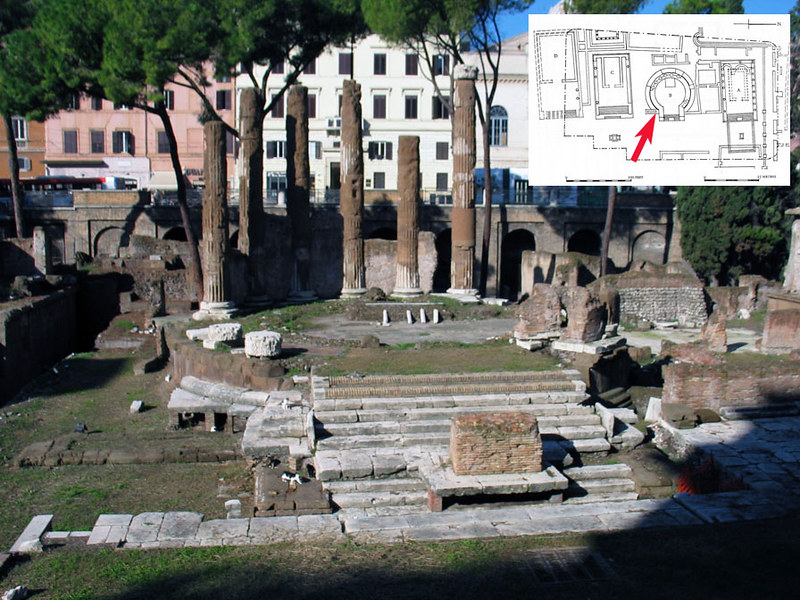
Largo Argentina (Temple B) por ortygia, en Flickr -
@hepf said:
I need some help for Sketchup (mostly from Csaba, I suppose). I often have to draw a floor plan, or something like that, on a fixed plane, let's say at z = 15. I am sure there must be a way to "freeze" the cursor so that it only moves in the xy plane, but so far I haven't found it ... and it drives me crazy ...

What I always do in that case, is simply draw a rectangle on the xy plane on te height you need and draw the floorplan on that. When it's finished, just remove the rectangle.
When I come home I will absolutely watch your video. I recognized parts of your model in the catalogue of the Divo Vespasiano exhibition, it made me smile

-
@pichuneke said:
An offtopic, but I believe that everybody here will be interested:
Found the exact place where Julius Caesar was assassinated (in spanish)
Very interesting and very surprising. I always thought the remains of the Pompeian Curia were located under the via di Torre Argentina, behind the temples, and completely invisible.
Another trivia on Caesar, while we're at it: many people believe that the temple of Caesar on the Forum was the place he was cremated, but it wasn't. He was supposed to be cremated on the Mars field and, going there from the rostra where his corps was displayed during the speeches of Octavianus and Marcus Antonius, people started to yell he should be cremated on the Capitoline hill. In this quarrel, two people suddenly set fire to the carriage and people started throwing flamable things on it so he was cremated on the spot.
The most probable location would then be somewhere between the rostra and the cross section leading to the field of Mars on one hand and mounting on the Capitoline on the other. So: about between the Porticus Dei Consenti and the temple of Saturnus, or just behind it.
That's my opinion, anyway
-
@fluffy82 said:
@pichuneke said:
An offtopic, but I believe that everybody here will be interested:
Found the exact place where Julius Caesar was assassinated (in spanish)
Very interesting and very surprising. I always thought the remains of the Pompeian Curia were located under the via di Torre Argentina, behind the temples, and completely invisible.
Another trivia on Caesar, while we're at it: many people believe that the temple of Caesar on the Forum was the place he was cremated, but it wasn't. He was supposed to be cremated on the Mars field and, going there from the rostra where his corps was displayed during the speeches of Octavianus and Marcus Antonius, people started to yell he should be cremated on the Capitoline hill. In this quarrel, two people suddenly set fire to the carriage and people started throwing flamable things on it so he was cremated on the spot.
The most probable location would then be somewhere between the rostra and the cross section leading to the field of Mars on one hand and mounting on the Capitoline on the other. So: about between the Porticus Dei Consenti and the temple of Saturnus, or just behind it.
That's my opinion, anyway
In fact I thought the same as you... but then I made a mistake and I pointed the wrong place. You are right. It seems that the monument is not the one I said. In this photo you can see the exact place (it was known before, but not with precision). The problem is that I have no more information, at least for the moment. If you don't mind, although this is an off-topic, If more information appears I will link it here. Anyway I think that the place must be visible.

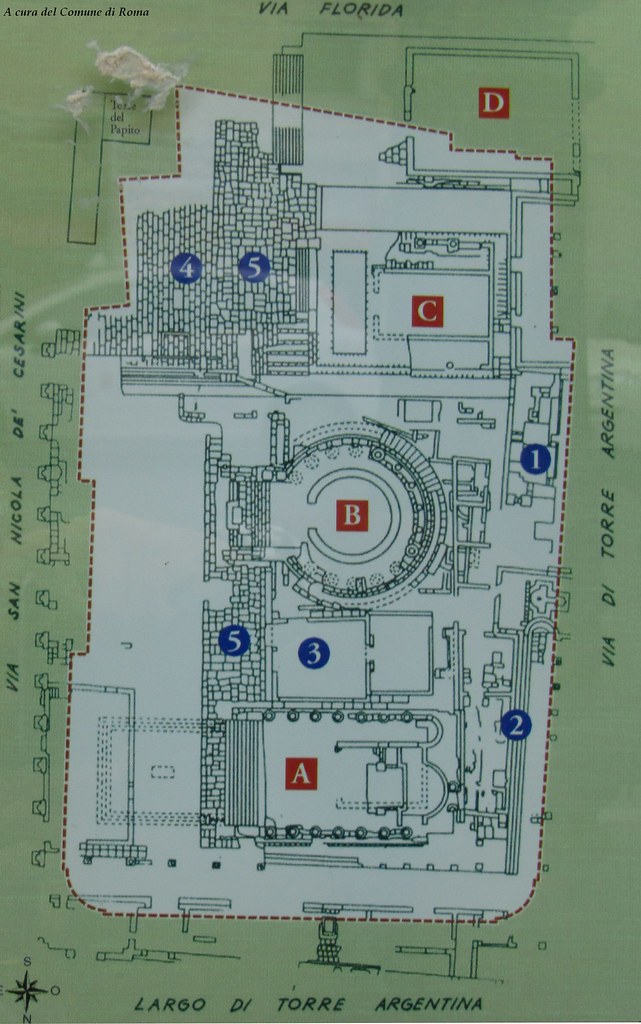
2011 Area Sacra, Largo Argentina por Roma ieri, Roma oggi di Alvaro de Alvariis, en Flickr
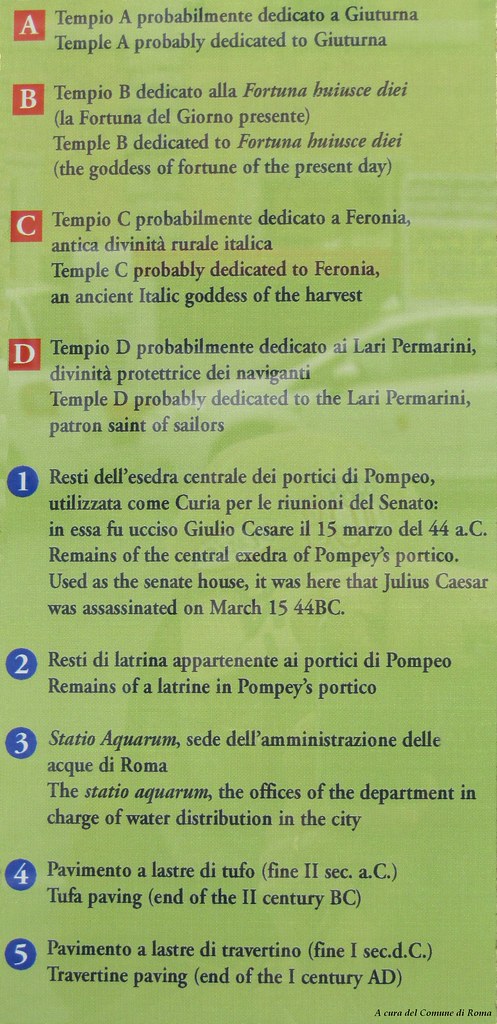
2011 Area Sacra, Largo Argentina por Roma ieri, Roma oggi di Alvaro de Alvariis, en Flickr -
It's a non new. Today a long paper appeared on the most important italian newspaper, "La repubblica", under a beautiful title: "Julius Caesar was killed at the tram stop". The supposed spot of the murder lies indeed under the final stop of the tram line 8.
The real news is that Prof. Carandini has published with the editor Electa an important atlas of ancient Rome. The first such work from Lanciani's atlas, of over a century ago. It's important news, but with little public appeal. So Carandini, and Electa (which belongs to Berlusconi), both experienced PR's, are drumming up attention with these supposed breakthroughs. And they are right to do so, if it serves to attract public attention ... but do not fall too much for it ...
This is the illustration on the newspaper
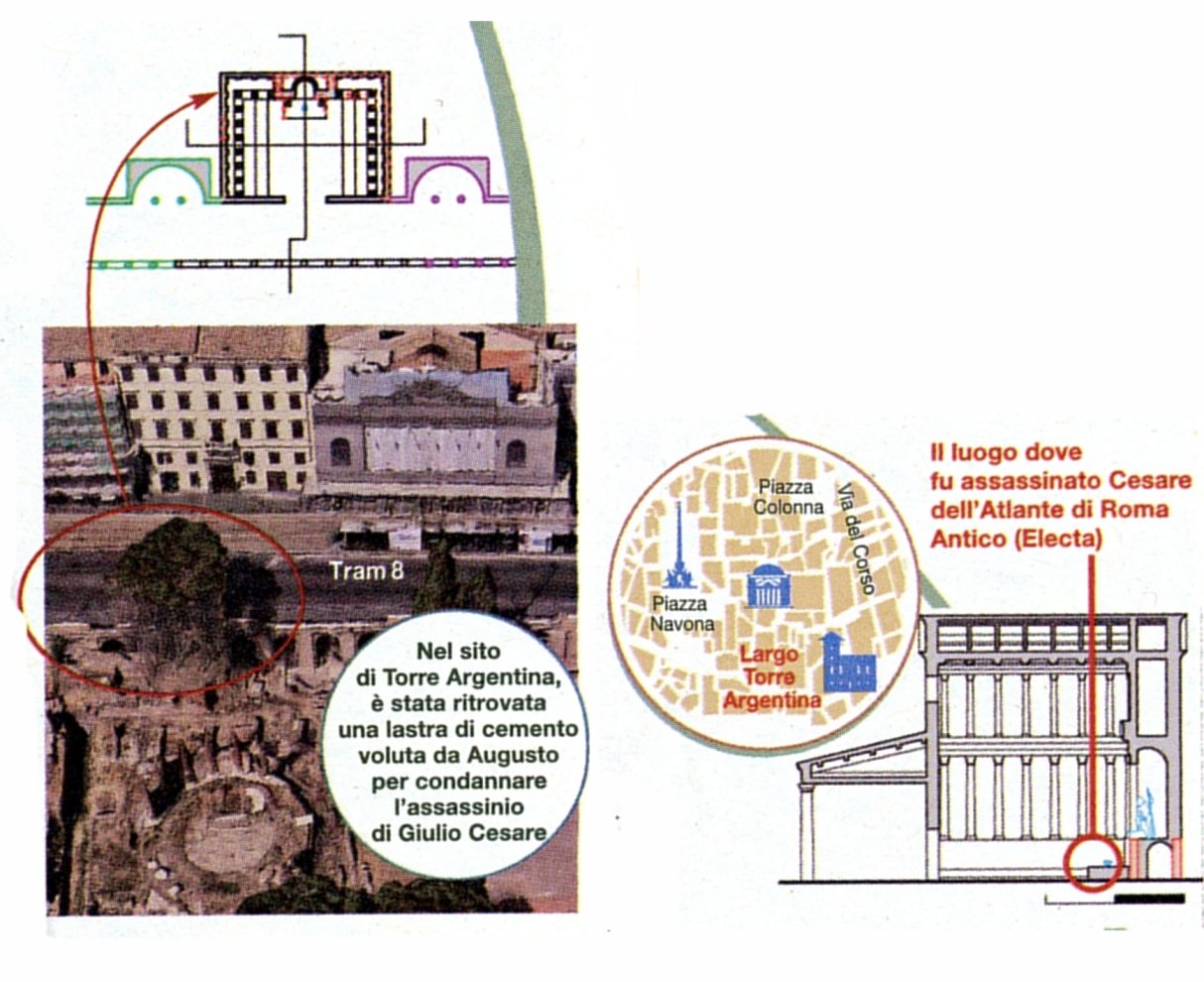
-
-
@hepf said:
It's a non new. Today a long paper appeared on the most important italian newspaper, "La repubblica", under a beautiful title: "Julius Caesar was killed at the tram stop". The supposed spot of the murder lies indeed under the final stop of the tram line 8.
The real news is that Prof. Carandini has published with the editor Electa an important atlas of ancient Rome. The first such work from Lanciani's atlas, of over a century ago. It's important news, but with little public appeal. So Carandini, and Electa (which belongs to Berlusconi), both experienced PR's, are drumming up attention with these supposed breakthroughs. And they are right to do so, if it serves to attract public attention ... but do not fall too much for it ...
This is the illustration on the newspaperThanks a lot hepf, I will transmit your information to other people like me, interested in these things. We've been discussing about it in other forums.
Advertisement

